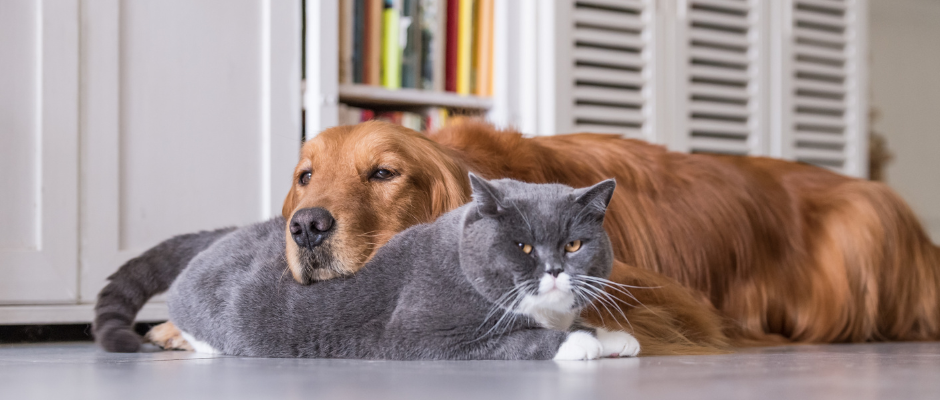As our beloved pets age, their needs change. They may require more frequent vet visits, special diets, and medications. They may also experience a decline in mobility, energy levels, and cognitive function. While caring for a senior pet can be challenging, it is also an incredibly rewarding experience. With a little patience and understanding, you can help your furry friend enjoy a comfortable and happy golden years. In this article, we will cover everything you need to know about caring for a senior pet, from health care to end-of-life support. So grab a cup of tea, cuddle up with your furry companion, and let's get started on this journey together.
The Importance of Senior Pet Care##

Just like humans, our pets go through the natural process of aging. As they enter their senior years, their bodies go through changes that can impact their overall health and well-being. This is why it is crucial to provide them with proper care and attention during this stage of their lives. Not only does it ensure their comfort and happiness, but it can also extend their lifespan and improve their quality of life.
Identifying Signs of Aging in Pets
The first step in caring for a senior pet is to recognize the signs of aging. Just like humans, every pet ages differently, and some breeds may age faster than others. Generally, dogs are considered seniors when they reach 7-8 years old, while cats are considered seniors at around 10-12 years old. However, larger breed dogs may start showing signs of aging earlier than smaller breeds.
Some common signs of aging in pets include:
- Gray hairs around the muzzle and eyes
- Decreased activity and exercise tolerance
- Changes in sleep patterns
- Loss of muscle mass
- Weight gain or loss
- Cloudy eyes or changes in vision
- Changes in appetite and eating habits
- Changes in behavior and temperament
- Difficulty standing up or getting up from lying down
If you notice any of these signs in your pet, it is essential to consult with your veterinarian. They can perform a thorough examination and recommend necessary lifestyle changes and treatments to keep your senior pet healthy and comfortable.
Nutritional Needs of Senior Pets##

Senior pets have different nutritional needs compared to their younger counterparts. As they age, their metabolism slows down, and they may not be as active as they once were. This means that they require fewer calories to maintain a healthy weight. However, they still need high-quality nutrition to support their aging bodies and prevent age-related health issues.
Sub Heading: Recommended Diet for Senior Pets
When it comes to the diet of a senior pet, it is essential to consult with your veterinarian. They can assess your pet's individual needs and recommend a diet that is tailored to them. Generally, senior pets benefit from a diet that is higher in protein and lower in fat. This helps to maintain muscle mass while preventing weight gain, which can put added strain on their joints and organs.
Moreover, many senior pets have dental issues, making it difficult for them to chew hard food. In this case, you may want to consider switching to soft or canned food, which is easier for them to eat. You can also ask your veterinarian about adding supplements, such as glucosamine and omega-3 fatty acids, to support joint health and cognitive function.
List: Foods to Avoid for Senior Pets
- Foods high in sodium and preservatives
- Fatty or greasy foods
- Dairy products
- Raw meat and eggs
- Foods with small bones that can be a choking hazard
- Chocolate, grapes, raisins, onions, and garlic (toxic to pets)
Exercise and Activity for Senior Pets##

Exercise is crucial for senior pets to maintain their mobility and overall health. However, it is essential to approach it with caution and not over-exert your aging pet. Just like humans, senior pets may have limitations and require a modified exercise routine.
Sub Heading: Recommended Exercises for Senior Pets
Aim for short, gentle walks for your senior pet, gradually increasing the distance and intensity as they are able to handle it. Swimming is also an excellent low-impact exercise for dogs and cats, as it reduces stress on their joints while providing them with a full-body workout. You can also engage your senior pet in interactive games such as fetch or puzzle toys that stimulate their minds and keep them active.
List: Signs of Over-Exercising in Senior Pets
- Panting excessively
- Limping or reluctance to move
- Slow or stiff movements
- Changes in behavior such as irritability or aggression
- Difficulty getting up or walking
- Refusal to eat or drink
- Excessive thirst
If you notice any of these signs during or after exercising with your senior pet, it is crucial to consult with your veterinarian. They can assess your pet's condition and recommend alternative exercises or adjustments to their routine.
Veterinary Care for Senior Pets##

Regular vet visits are essential for senior pets to ensure early detection and treatment of age-related health issues. Your veterinarian can perform a thorough examination and run necessary tests to monitor your pet's overall health and identify any potential problems. They can also recommend necessary preventive measures to keep your senior pet healthy and comfortable.
Sub Heading: Recommended Vet Visits for Senior Pets
As a general rule, senior pets should visit the veterinarian every 6 months for a check-up. However, this may vary depending on your pet's specific needs and any underlying health conditions. Some pets may require more frequent visits, while others may only need annual check-ups.
List: Common Tests for Senior Pets
- Blood work to assess organ function and screen for diseases
- Urinalysis to check for kidney health and urinary tract infections
- X-rays to evaluate joint health and detect any abnormalities
- Blood pressure measurement to assess heart health
- Dental examination and cleaning
- Eye examination for signs of cataracts or other eye conditions
- Ultrasound to look for abdominal tumors or masses
Regular vet visits also give you the opportunity to discuss any concerns or questions you may have about your senior pet's health and well-being. It is crucial to be proactive in managing your pet's health to provide them with a happy and comfortable life.
Managing Chronic Conditions in Senior Pets##
As pets age, they become more susceptible to chronic conditions such as arthritis, diabetes, kidney disease, and cancer. These conditions can be managed with proper care and treatment, but it is essential to work closely with your veterinarian to ensure your pet's comfort and well-being.
Sub Heading: Medications and Treatment Options
If your senior pet has been diagnosed with a chronic condition, your veterinarian may prescribe medications to manage their symptoms and slow the progression of the disease. Depending on the condition, this may include pain relievers, anti-inflammatories, insulin injections, or chemotherapy drugs.
List: Alternative Treatments for Senior Pets
- Acupuncture
- Massage therapy
- Physical therapy
- Laser therapy
- Herbal supplements
- CBD oil
It is crucial to consult with your veterinarian before trying any alternative treatments for your senior pet. They can advise you on the potential benefits and risks, as well as recommend qualified practitioners who specialize in treating senior pets.
End-of-Life Care for Senior Pets##
Saying goodbye to a beloved pet is never easy, and it can be even more challenging when they have been a part of our lives for many years. As pet owners, it is our responsibility to make sure our senior pets are comfortable and have a good quality of life until the very end.
Sub Heading: Deciding on Euthanasia
While it is a difficult decision to make, euthanasia can be a compassionate and humane option for senior pets who are suffering from a terminal illness or have a poor quality of life. It is important to work closely with your veterinarian to determine when the right time is for your pet.
List: Signs that Your Senior Pet May Be Suffering
- Difficulty breathing
- Refusal to eat or drink
- Incontinence
- Severe pain or discomfort
- Loss of bowel and bladder control
- Chronic vomiting or diarrhea
- Lethargy and lack of interest in activities they once enjoyed
It is essential to consider your pet's overall well-being and not just their physical condition when making this decision. Your veterinarian can provide you with guidance and support during this difficult time.
Emotional Support for Senior Pets##

As our pets age, they may need extra emotional support to help them cope with changes in their bodies and routines. They may also experience anxiety or stress due to age-related health problems or the loss of a companion. As pet owners, it is our responsibility to provide them with comfort, love, and attention during this stage of their lives.
Sub Heading: Ways to Provide Emotional Support
- Maintain a consistent routine for your pet
- Spend quality time with them, whether it's cuddling, playing, or going for walks
- Provide them with a comfortable and safe environment
- Consider getting a companion for your senior pet if appropriate
- Consult with your veterinarian if your pet is experiencing behavioral changes or seems anxious or stressed
Quality of Life for Senior Pets##

Ultimately, our goal as pet owners is to ensure that our senior pets have the best quality of life possible. This means providing them with the necessary care, love, and attention to keep them comfortable and happy.
Sub Heading: Tips for Improving Quality of Life
- Keep your pet's living space clean and comfortable
- Ensure they have access to fresh water at all times
- Provide them with a soft and warm bed to rest in
- Use ramps or stairs to help them get on furniture or in the car
- Keep them mentally stimulated with interactive toys and games
- Consider getting a pet stroller for longer walks
- Consult with your veterinarian about pain management options if necessary
- Give them plenty of love and attention every day
Common Health Issues in Senior Pets##

Just like humans, senior pets are more prone to a variety of health problems. It is essential to be aware of these issues so that you can watch out for any potential symptoms and seek veterinary care promptly.
List: Common Health Issues in Senior Pets
| Health Issue | Symptoms | Treatment Options |
|---|---|---|
| Arthritis | Difficulty moving, stiffness, limping, reluctance to jump or climb stairs | Pain medication, joint supplements, exercise, physical therapy, acupuncture |
| Heart Disease | Coughing, difficulty breathing, fatigue, loss of appetite, weight loss | Medication, dietary changes, surgery |
| Kidney Disease | Increased thirst and urination, weight loss, loss of appetite, lethargy | Specialized diet, fluid therapy, medication |
| Cancer | Lumps, bumps, visible tumors, changes in behavior or appetite | Surgery, chemotherapy, radiation, palliative care |
| Dental Issues | Bad breath, bleeding gums, difficulty chewing, drooling | Dental cleaning, tooth extraction, special diet |
| Cognitive Dysfunction | Confusion, disorientation, changes in sleeping patterns, increased anxiety | Medication, mental stimulation, environmental enrichment |
It is crucial to consult with your veterinarian if you notice any of these symptoms in your senior pet. Early detection and treatment can significantly improve their quality of life and potentially extend their lifespan.
Conclusion##
Caring for a senior pet may come with its challenges, but it is also an incredibly rewarding experience. With proper care and attention, you can ensure that your furry friend enjoys their golden years to the fullest. Remember to consult with your veterinarian regularly, provide them with a nutritious diet and exercise, and give them plenty of love and emotional support. Cherish every moment you have with your senior pet and treasure the memories you have created together.



